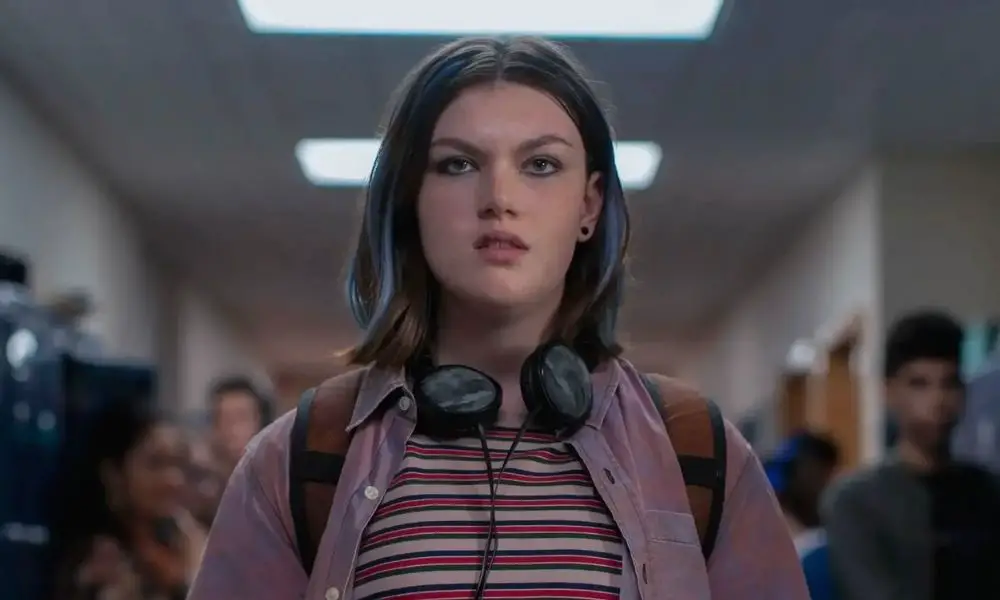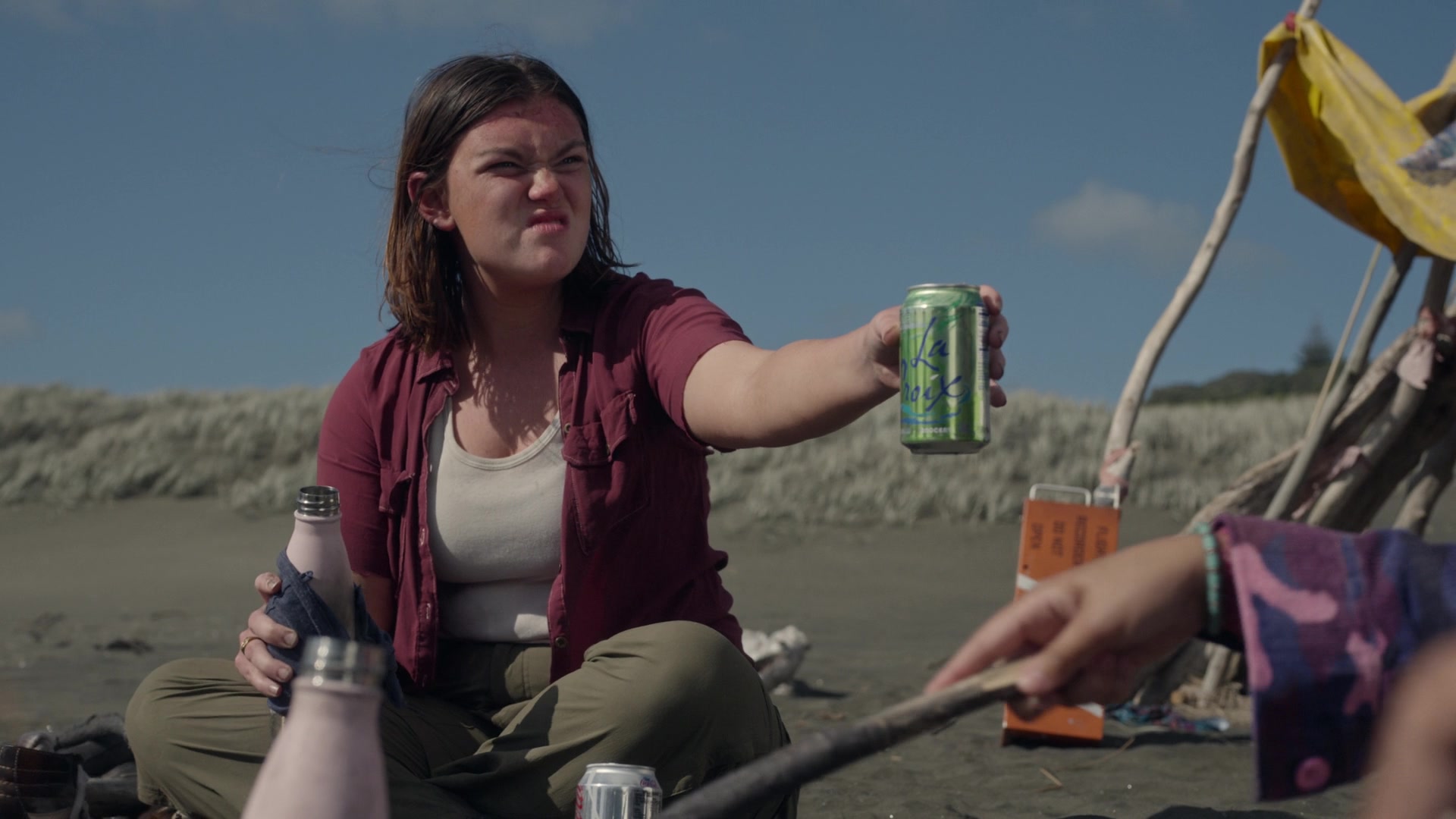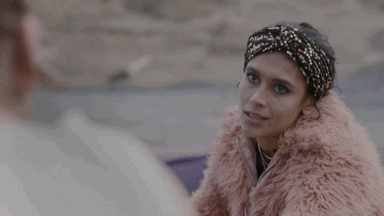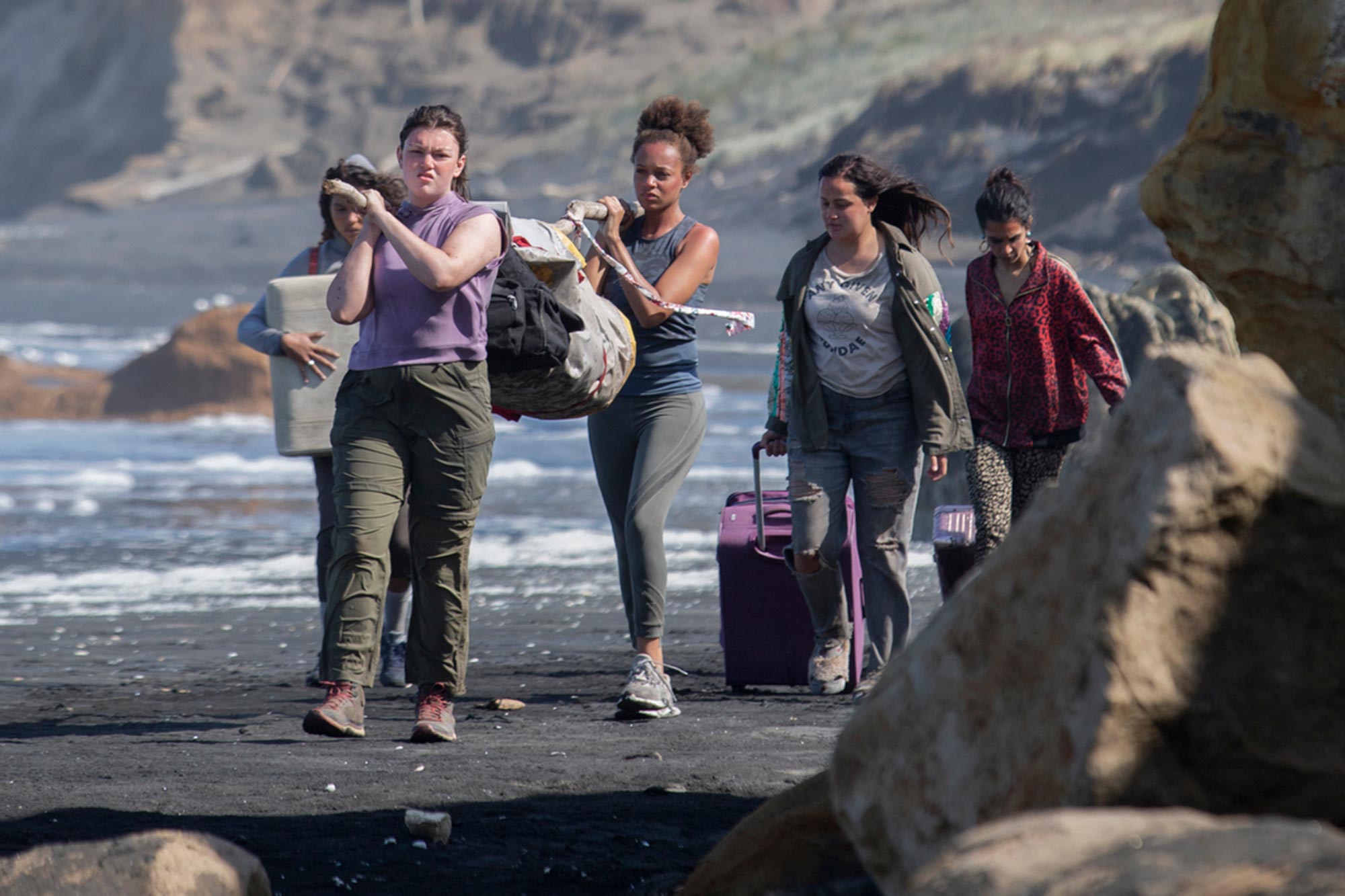Here at The Fandomentals we have been building up a family of character types. You can take a peek at our Dutiful Princesses, our Suffering Empaths, our Glorious Dumbasses, and our Disaster Chosen Ones. Set as we are in our over-analyzing ways, our archetype family keeps growing.
A recent addition to the trope family is The King. They are not characterized by their gender, but rather by their capacity to get things done. They are the ones usually saving the other characters. They are the de-facto leader, but they don’t get the position through violence or force. They earn the position through empathy and understanding.
Heavy is the head that wears the crown, though. The King is the one who bears burdens for others, and makes difficult choices, often putting others before themselves.
I hereby postulate an ideal candidate: Dot, from The Wilds. Yes, I’m gushing about this show again, who’s surprised? Dot deserves it, though.
I can hardly think of a character who embodies The King better than Dorothy “Dot” Campbell.
This is Dot

From the outside, Dot gives off a disaffected, even hard vibe. The teenage rebel who smokes, sells drugs, who is uninvolved with her peers, and appears to just not care. Upon closer inspection, Dot cares the most. Always.
Dot is the person who does her best to offer comfort to Fatin as she has a panic attack on the island, despite not knowing or even liking her. She runs to help Jeannette and Leah without second thought.
She’s the first one to take charge and start counting their resources, takes the unspoken role of leader when it comes to their survival. She pulls from the many survival shows she’s watched with her father.
She has a wry comment for every situation, but she also has empathy for everyone. Dot doesn’t judge others on first impressions or stereotypes; she gives people the benefit of the doubt, even when she doesn’t particularly like them, even when they perhaps don’t deserve it.
“You think you know what you’ve got buried down there… under the surface, but you don’t always.”
Perhaps this is because Dot knows what it’s like to be judged on a surface level. She knows that the façade you put on to the outside world is just that, and that there’s often so much more going on under the surface.
Dot’s Burden
In Dot’s episode, we discover that Dot looked after her dying father for an unspecified amount of time. Without another parent to speak of, she took on the burden of his care in its entirety, emotional and financial.
Shelby mentions early on that rumors circulated about Dot selling drugs. Turns out, the rumor was true. One of her father’s prescriptions caused side effects, so she took the opportunity to sell the drug in order to make more money and afford the expenses of his care.
Dot prioritizes that over anything else. She has foregone friendships, social events and even resists her budding feelings for his father’s nurse, Mateo. She’s stopped being a kid, basically.
Her dad sees this, and it’s hard for him, too. From what we glean, he is a good father; loving and attentive. He used to be a soccer coach, by all accounts a sporty kind of guy. That all goes out the window when he gets sick.
Dot has to take him to the bathroom, he’s so weak, and that hurts him on several levels. Dot takes on this hurt from her father, too. She tries to shield him as much as possible. She puts on the front of the tough one. This is all cool, it’s not affecting her… he can’t see the full height of the toll it’s taking on her. A King, after all, must remain diligent in their task, and that sometimes involved not letting others see how hard it is for them.
Her dad sees some, of course. He wants to relieve Dot of the burden, but also free himself of his pain, and so he asks the impossible of Dot. He asks her to end his life.
This is simultaneously a selfless act and an almost incomprehensibly selfish thing to do.
It would free Dot from the burden of him, but the loss of him would hurt. Dot can’t say no to him, because she loves him so much. She puts on his favorite song, holds his hand and listens as he tells her his plan for the future and takes in his goodbye. He must know that the responsibility of ending his life is a biggie, to say the least. But Dot is his strong girl, the tough girl. She can take it… right?
In a bit of cruel irony, her father’s plans to secure her future are what lands Dot in a deserted island, fighting for her survival in a messed up social experiment that seriously needs to be peer-reviewed.
She Doesn’t Get to Rest

Thanks to Gretchen Klein’s manipulation of her father and later Dot (the exact terms of their agreement still unclear), Dot doesn’t get a moment’s respite after the loss. She gets on that plane to Hawaii and ends up on the island, with seven girls who are happy to let her take charge.
At this point, Dot is used to having serious responsibilities. She’s seventeen but in many ways she’s played the role of adult for a long time. She easily falls into the role of leader without even trying.
As the King she is, Dot’s style of leadership isn’t authoritative, or violent. She is capable, she has the answers more often than any of the others – what with her and her dad’s obsession with survivor’s reality shows – and the girls quickly catch on. They’re always turning to her for solutions, deferring to her for important decisions.
Inadvertently, they’re putting it all on Dot. If something goes wrong it can be blamed on her, and even though the others don’t necessarily do that, Dot certainly takes the brunt of the self-imposed blame when things go awry.
Like when she decides to move them to a cave she and Shelby found to protect them from the weather. They end up leaving due to the cold. Dot refers to a bat pooping on her mouth as consequences of her bad decision, since it was her idea. This is framed as a joke, and lighthearted, but when you take into account other instances of Dot taking the responsibility and blame by herself, they start stacking up alarmingly high.
When the lighter is lost, she takes full responsibility, even though no one’s taken any care with the lighter before, comfortable leaving it to Dot.
“I know how bad this is for us, and I’m sorry, but if you’re tempted to make me feel like sh*t, don’t bother. I’m doing a pretty good job of it on my own.”
– Dot to Rachel
On their twelfth day on the island, all of the girls, bar Shelby, eat some mussels Rachel’s found. When they all get food poisoning, it’s Dot who takes charge, even though she is also sick. She watches Toni, who’s illness seems to be life-threatening, and sends Leah to get the medicine they need. Shelby is nowhere to be found.
Leah comes back with an incomplete inventory, having dropped the bag in the forest in her pursuit of Shelby during a bout of paranoia. Later, when Martha’s life is in danger as well, and Leah confesses what happened to the medicine, is one of the few times Dot loses her cool with one of the girls.
Her frustration gets the best of her and she pushes Leah, chastising her. But the question she asks is “why didn’t you tell any of us before?”. It’s not “You’re an idiot, this is your fault”, it’s more asking Leah to ask for help, a “you should have opened up, someone could have helped.” The blame falls on Leah, and Dot’s aggression is a manifestation of the gravity of the situation. Still, Dot simply asks Leah to take her there. She’s not about laying blame to make people feel like crap. She asks Leah to take responsibility, bit is not about to throw it in her face in a way that is hurtful, even in this moment of urgency.
Empathy is Key
The defining characteristic of Dot’s leadership style is empathy. She has it for everyone, but it’s interesting how much of it she has for the people who present the toughest exteriors, or are the hardest to like.
In the season finale, they’ve been starving for days, and Martha kills the goat. It’s life-saving, and in their hunger, Fatin and Rachel fail to notice anything amiss. Dot does, however. She is able to see, beyond her hunger, that Martha is not okay.
She doesn’t fully know what’s going on. Martha’s traumatic backstory is revealed to us, not Dot. But she knows enough to understand that it was a big moment for Martha. Through her limited understanding she extends what comfort she can. It might not be the best thing to say, but it’s so meaningful that someone saw, someone tried.
That’s another thing about Dot. She’s empathetic, but she’s not necessarily the most eloquent. It’s important to remember her social experience is limited. She still tries her very best, always. Dot is also perceptive. She interacts with each girl differently, and extends different types of sympathies and comforts.
She tries all out comforting words with Martha. But when Rachel complains to her about Leah’s attitude, she tries some cold hard truth.
“You’re both trying to give each other the same damn advice.”
– Dot to Rachel
She holds up a mirror to Rachel. The latter is not very receptive at the moment, but it does go to show just how much Dot observes about the other girls. She tries something similar with Shelby, at first throwing truth bombs and then trying the “you tell me something, I tell you something” approach. Later, when Shelby has her meltdown, she offers her the vodka as an invitation to partake in the fun – this one does backfire. Dot’s not perfect in the social finesse front.
Leah I is the hardest for Dot to pinpoint. Ultimately Dot is unequipped to help, and offers what she can: medication and vigilance, to try to protect Leah from herself.
Then there’s Fatin.
A King Needs a Right Hand
The entire island situation is decidedly messed up. It is ethically wrong no matter which way you look at it. Yet part of the complicated thing (and likely something we’ll hear Gretchen say at some point) is that it does allow for growth for most of the girls, in some way.
For Dot the island doesn’t mean being unburdened by their situation back home. No sooner does she arrive, she becomes mother hen to seven very troubled chickens. But it does allow Dot to find something she didn’t have at home: her people. And her people is Fatin.
Fatin comes off as superficial even a little vapid. Yet Dot immediately understands there is more to her than meets the eye.
Even when Fatin is being decidedly unpleasant, Dot is prepared to give her the benefit of the doubt. When she wants to slack off on the shelter-building contest, Dot’s prepared to let her skip work unfairly. Later, when she disappears after stealing water rations, Dot jumps to her defense against Leah.
“I don’t know. I always thought Fatin ran a bit deeper than the whole princess shtick. Ever see her hands? Dude, calloused as f*ck. Whatever that girl was doing before she got here, she wasn’t half-assing it.”
– Dot to Leah
I think part of this is due to the fact that Fatin is one of only two people who lighten the load for Dot here on the island. The second person is Shelby, who notices how much pressure Dot’s under. She’s ready to remind everyone it’s not all on Dot, or offer words of comfort when Dot questions her decisions. Fatin plays a different role, but just as important, if not even more so. Fatin makes Dot laugh.

They feel at ease with each other. They’re comfortable making fun of each other and joking around. They even plan to move in together after they come back from the island. Remember, Dot hasn’t had many – or any – friends since her dad got sick. Just having someone to relax with even if just for a moment in the day would lighten Dot’s considerable load.
And still, Fatin does more than that. After all, she’s the one who listens to Dot’s survivor show advice and uses it to find water and mark a path to it. She’s the other one who looks after Toni when she’s near-death, and she’s able to give Dot the support she so needs in regards to Leah.
Dot and Fatin’s connection is near instant. They develop a rapport and a banter almost from day one, and from there, it is clear Dot has found her best friend. The King has a right hand, who she can rely on to help her carry her heavy load.
But even with Fatin’s help, it can be too much.
Child King

At the end of the day, for as much as Dot’s carried responsibilities beyond her age, she’s still a child. She’s seventeen, in charge of seven other seventeen-year-olds. She is in way over her head.
Come day fifteen on the island, after the tide washes away their camp and their shelter, the girls sit around waiting. They don’t say, perhaps they don’t even know they’re waiting for Dot to decide what comes next, but that is what they’re doing.
Dot announces that they’re moving to another beach farther from the shore. When they get there however, Dot renounces her crown – in this case symbolized by the lighter – and hands it over to Rachel. She’s done making the decisions and taking all the blame. She hands the baton to the one person who’s shown aspirations of leadership.
Rachel soon discovers that the mantle doesn’t come easily. The trust and respect the others extend to Dot is not a cheap thing that can be afforded by a metaphorical crown. Suffice to say, it’s not a peaceful transition of power. In fact, the situation goes to blows alarmingly quick.
Dot, bless her, is unable to stay uninvolved for long. She cares, she always cares. As much as she would like to, she cannot look the other way.
“This right here, this ain’t happening. If we go out, and I’m not so sure that we won’t, it’s not gonna be at each other’s throats because there is zero f*cking dignity in that.”
When she steps in, she finally delivers the cold hard truth to the girls: It’s most likely they’ll die here. Her role as King is perhaps heaviest here, as she has to look at these girls – her friends – in the eye and tell them their situation is hopeless, but at the same time make them understand they should go with dignity… perhaps like her dad wanted to.
In a bout of terrible luck, just after this their first hint of real hope appears in the sky in the form of a plane. Dot’s realism sees a rival, and she’s so happy to be proved wrong, that she makes her gravest mistake yet.
The King (Never) Fails
Dot lets them eat all their rations, convinced that the plane means rescue. It doesn’t, and they end up almost starving.
Our King takes this heavily, blaming herself and half-heartedly accepting comfort from Shelby when she beats herself up over it. This is a Dot right after she was ready to just give up, given hope that was slowly taken away from her.
Of course, she shouldn’t have the weight of it on her shoulders. If anyone is to blame, it’s Gretchen (and perhaps to a smaller degree her spy on the ground). It is utterly unfair that Dot is yet again in a position where others’ lives or deaths depend on her. She’s clearly tired of it.
And still, as soon as someone needs her again, the King is there, ready to try and comfort Martha, and to save Leah’s life and finally give her the medication to try to stop her from hurting herself again.
No matter what happens, Dot carries the burden. She puts Martha’s and Leah’s and all the other’s needs before her own. Her own need for comfort, for rest and her own need of saving.
Dot feels terribly guilty at this point, and heavy with the burdens she’s had to carry around. Still, she’ll be steadfast and strong when someone needs her. Again, Dot always cares. She always cares the most.
She can only do so much, but she does so much. She’s there for advice, to find a solution, to offer a comforting word, a truth bomb or even some vodka. All the while she asks for little or nothing in return. She’s taken on too much, but we can be sure she’ll see it through to the end.
Like I said. If anyone ever was The King, it is Dot Campbell.
Images courtesy of Amazon.
Have strong thoughts about this piece you need to share? Or maybe there’s something else on your mind you’re wanting to talk about with fellow Fandomentals? Head on over to our Community server to join in the conversation!

